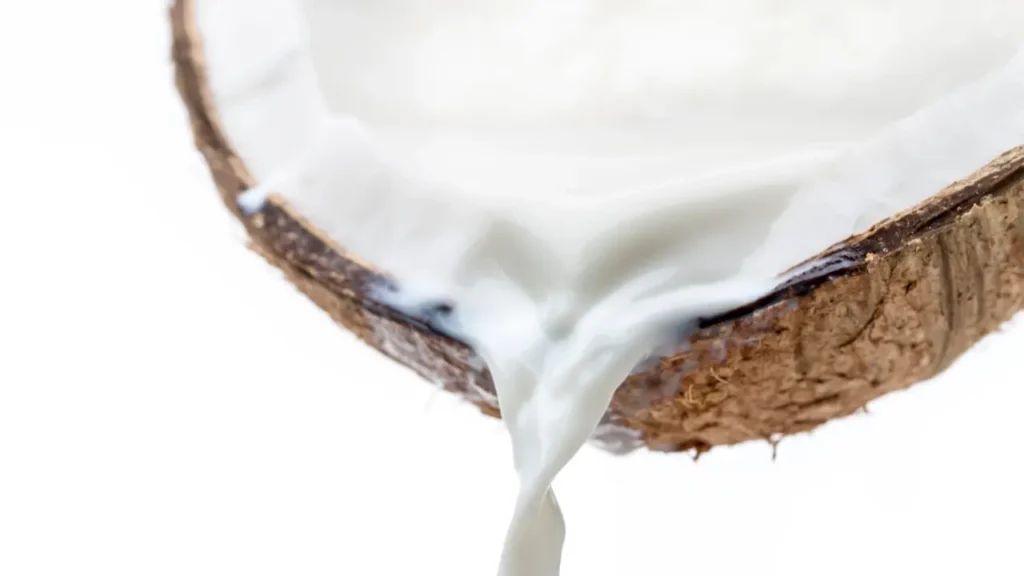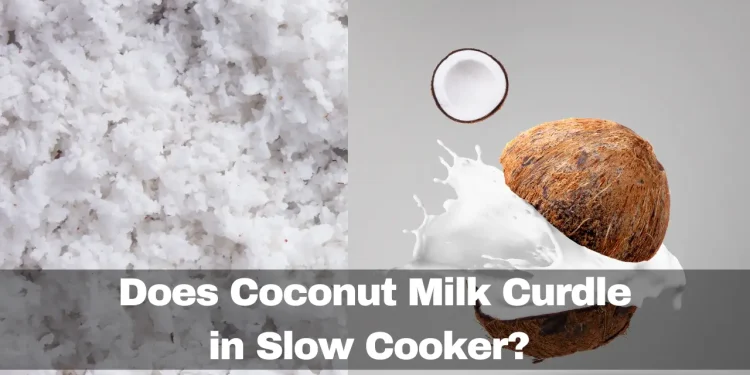Slow cookers have become a staple in many households because they make cooking great meals easy and save time. At the same time, coconut milk has become a popular addition to many dishes due to its unique taste and creamy texture. But the common question is whether coconut milk turns sour when boiled in a slow cooker. This section will discuss “Does Coconut Milk Make Curdle in a Slow Cooker?”
Understanding Coconut Milk- (Does coconut milk curdle in slow cooker)
Coconut milk is a thick, milky liquid from the flesh of ripe coconuts. It is used in many ways, especially in Asian, Caribbean, and Latin American cooking. To understand how coconut milk works in a slow cooker, you must know how it differs from coconut water and coconut cream.
Coconut Water: The clear juice inside young, green coconuts is coconut water. But coconut water and coconut milk are not the same thing. It is more watery and has a light, slightly sweet taste. Coconut water isn’t often used in slow cooker recipes and doesn’t curdle like coconut milk.
On the other hand, Coconut Cream is a version of coconut milk that is thicker and more concentrated. It is made by boiling coconut milk until most of the water disappears, leaving behind a rich and delicious cream.
Coconut Milk: Coconut milk is a flexible mix of coconut cream and water. It is made by grating the white flesh of full-grown coconuts and then squeezing and draining the liquid out. Coconut milk has a thick texture and a slightly sweet taste because it has both the fat and natural sugars of the coconut.

The composition of coconut milk
Coconut milk has many unique components.
Coconut milk’s fat content is unique. Fat makes coconut milk creamy. Coconut flesh is fatty due to natural oils.
Natural Emulsifiers: Coconut milk naturally emulsifies fat and liquid. These emulsifiers, like proteins and phospholipids, preserve and smooth coconut milk.
Coconut milk also contains vitamins and minerals. However, high-fat and natural emulsifiers are always included.
A slow pot heats coconut milk’s rich fat and emulsifiers.
The significance of fat and emulsifiers in preventing curdling.
Fats and emulsifiers stabilize and smooth coconut milk to prevent curdling.
Coconut milk’s high-fat content prevents curdling. Fat separates liquids and other substances, preventing curdling. It smooths coconut milk.
Cooking coconut milk uniformly distributes fat molecules. This reduces hot areas and prevents milk curdling. Fat shields proteins from heat, preventing them from degrading or coagulating.
The significance of fat and emulsifiers in preventing curdling.
Fat and emulsifiers stabilize and smooth coconut milk to prevent curdling.
Coconut milk doesn’t curdle since it’s heavy in fat. Fat separates the liquid from the other components, preventing curdling. It smooths coconut milk.
Heat spreads fat molecules throughout coconut milk. This uniformly distributes heat and prevents hot spots from curling the milk. Fat shields proteins from heat, preventing them from breaking down or curdling.
Coconut milk’s fat provides sweetness and mouthfeel. It adds flavor and texture to dishes.
Coconut milk proteins and phospholipids are natural emulsifiers. Emulsifiers stabilize and prevent curdling. They bind water and fat molecules. Solid emulsion results.
Coconut milk emulsifiers coat fat globules. They also evenly distribute fat in coconut milk. Emulsifiers stabilize this emulsion, preventing separation.
The Science Behind Curdling
Curdling is a typical process in which proteins produce milk. Dairy, plant-based, and coconut milk contain milk thistle. When fluid proteins lose form and cling together, solids and liquids separate.
Heat, acid, and proteins produce milk itch. Let’s examine each factor:
Freezing requires heat. Proteins in a fluid change shape when heated.
Acid: Proteins dissolve electrostatically under acidic environments. Proteins lose structure, and the fluid thickens when the acid lowers the pH.
Protein: Proteins stretch and interact when heated or acidified.
Factors Affecting Coconut Milk in a Slow Cooker
Coconut milk may curdle in a slow cooker. For best results, know the following:
- Heat: Slow cookers maintain 175°F to 212°F (80–100°C). Most foods can withstand moderate heat, but extreme heat may curdle them. If overcooked, coconut milk may lose its structure.
- Acidity: Some slow cooker recipes include citrus, vinegar, or tomatoes. Acidic coconut milk curdles more. To avoid curdling, add coconut milk last to sour recipes.
- Longer cooking curdles coconut milk. Overcooking destroys coconut milk’s emulsifiers. Add coconut milk in the last five minutes to prevent curdling or cook less.
- Over-stirring or shaking coconut milk in a slow cooker may break its emulsion and cause it to curdle. Combine carefully to avoid separating fat and water.
Preventing Coconut Milk from Curdling
Tricks to keep coconut milk-based slow cooker foods smooth and creamy:
- Avoid overheating coconut milk by adding it late in the cooking process.
- Change the cooking temperature: Slow cookers cook at low temperatures, so use the lowest setting possible.
- Stir less. Slow cookers cook evenly by stirring, but too much stirring separates coconut milk’s fat and water.
- Quality Coconut Milk: Choose quality coconut milk.
- Tomatoes with citrus drinks may curdle. To avoid affecting coconut milk, add them later or in smaller amounts.
- Creamed coconut or coconut cream may prevent slow-cooker coconut milk from curdling. Fat decreases product separation.
- Before putting coconut milk in the slow cooker, add cornstarch or starch if you think it may separate. Starch prevents milk clots.
Recipes and Ideas
After reviewing coconut milk’s qualities and how to prevent curdling in a slow cooker, here are some great ways to use it:
- Slow Cooker Thai Curry: Slow simmer coconut milk, protein (chicken, beef, or tofu), veggies, and Thai curry sauce for a tasty and fragrant Thai curry. Simmer low for hours to blend flavors. Fill with cooked rice.
- Coconut Rice Pudding in a Slow Cooker: Mix coconut milk, rice, sugar, and favorite spices like cinnamon or cardamom. Simmer until rice is soft, and the sauce thickens—toast coconut chunks.
- Slow Cooker Coconut Chicken Stew: Slowly cook chicken pieces, coconut milk, chopped veggies, fragrant herbs, and spices to form a rich and comforting stew. Simmer until the chicken is tender. Toast or steaming rice.
- Slow-cooker coconut oatmeal is tasty and healthy. Slow-cook oats, coconut milk, water, favorite sweetener, and salt.
Conclusion- (Does coconut milk curdle in slow cooker?)
Slow-cooker coconut milk is flexible. Knowing it has plenty of fat and natural emulsifiers minimizes curdling and keeps your recipes smooth and creamy.
Fat and emulsifiers prevent curdling. Fat distributes heat to protect proteins. Coconut milk naturally emulsifies.
Heat, acidity, cooking duration, shaking, and ingredient interactions may curdle slow-cooker coconut milk. Change the cooking temperature, add coconut milk at the end, don’t move, reduce acidic ingredients, and use suitable coconut milk to avoid curdling.
Slow cooker coconut milk meals include Thai curry, rice pudding, lentil soup, chicken stew, and breakfast.
Slow cooker methods improve coconut milk cooking. Enjoy coconut milk’s luscious richness and play.
Read –










